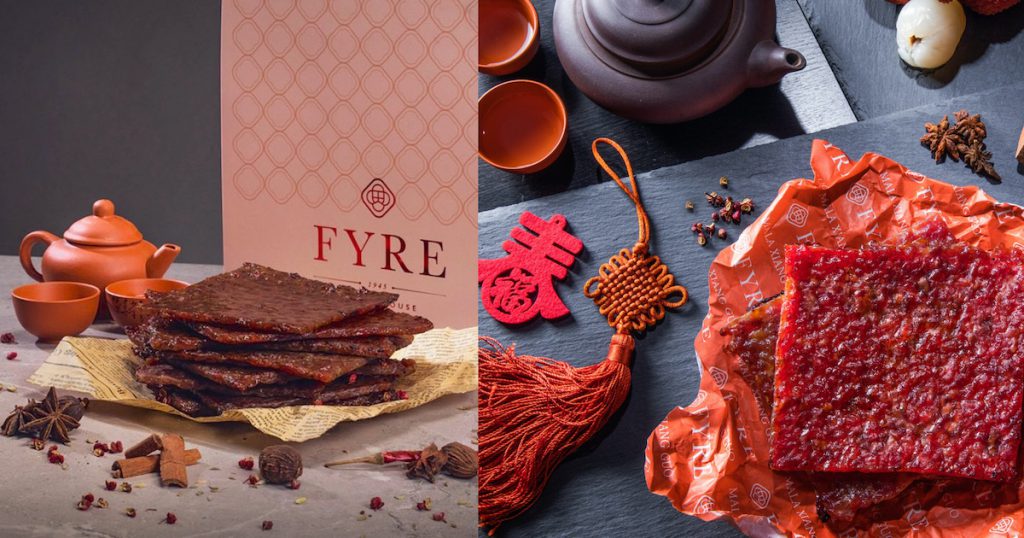Seasoned with Southeast Asian spices then slow-grilled to perfection, bak kwa (or barbecued pork), is a quintessential snack at every Chinese New Year gathering.
Heritage bak kwa brands like Bee Cheng Hiang and Lim Chee Guan have been around for decades, and are well-loved by Singaporeans.
For Lim Chee Guan, snaking queues — with a wait time of up to six or eight hours — are a common sight during the festive season. The Covid-19 pandemic has forced it to pivot online as it opens online pre-orders to avoid long queues forming at their outlets.
Amid the pandemic, new players like Fyre Singapore have popped up in the bak kwa scene with the hopes to disrupt the century-old industry.
The Evolution Of Homemade Bak Kwa

Launched last year, Fyre was started by a 29-year-old Singaporean, who wants to be simply addressed as Ong.
According to him, Fyre was first conceptualised in 2017 but it was only able to launch three years later due to “a lack of experience in F&B manufacturing and talents in the field.”
Ong is a self-professed foodie who looks forward to eating bak kwa every Chinese New Year. Coming from a large family, Ong shared that the barbecued meat was a “must-have” at annual family gatherings.
However, after years of consuming bak kwa from the same brands, Ong’s family decided to try their hand at making their own bak kwa.
It was well-received among family and friends, and Ong was encouraged to make his family recipe available to the mass market.
He then roped in F&B and other relevant experts to start the Fyre Singapore brand.
Riding On The Mala Xiang Guo Wave

Mala Xiang Guo is a dish that originated from China, and it has been trending in Singapore for years.
Mala (麻辣) directly translates to ‘numb’ and ‘spicy’, which can be attributed to the sensation usually felt after consuming the dish.
Judging by how the mala trend in Singapore has not been dying down over the years, Fyre decided to incorporate this fiery flavour into its bak kwa.
It all started when Fyre’s head chef stir-fried their Original 1945 bak kwa slices into the mala dish. The team absolutely loved the end result.
We subsequently thought: “Why should bak kwa be the supporting ingredient of Mala Xiang Guo and not vice versa?”
The team then worked on infusing the goodness of Mala Xiang Guo into a compact slice of pork.
Ong, Founder of Fyre Singapore
Ong told Vulcan Post that the team exhausted around 400 kilograms of meat and spices before they got the formula right.
“It was a tedious and expensive R&D process, but a very satisfying one,” he added.
Besides the mala-flavoured jerky, the brand’s first product is its Classic Original 1945 Lychee and Apple Wood Bak Kwa.

The meat is smoked with lychee and apple wood for a sweet and fruity scent. Ong shared that his inspiration behind the use of this technique was from the traditional Chinese dish, Peking Roast Duck.
Whilst visiting China during his studies, Ong studied the making of Peking Duck, and realised that a key aspect of the dish was actually lychee wood. He then decided to incorporate this method when making his own bak kwa.
Achieving Six-Figure Sales In Two Weeks

A 1kg box of Mala Xiang Guo Bak Kwa goes for S$128, while the original goes for S$118.
According to Ong, Fyre achieved six-figure sales within the first two weeks of launch.
On the first week, the brand sold about 700 sets of its Mala Xiang Guo Bak Kwa, and the response was so good that the brand’s “business phones were ringing non-stop.”
Apart from retail customers, the brand also received interest from corporate clients.
Besides its Mala Xiang Guo flavour as a unique selling point, Ong shared that the brand also only uses quality ingredients and meat cuts.
Their bak kwa is also individually vacuum packed to ensure freshness in every bite.
Redefining Traditions
Fyre Singapore is founded on the value of “redefining traditions”.
The brand believes that traditions can only be preserved through modernity, innovations and perseverance; and it aims to provide every customer with a new experience.
It also aims to educate the younger generations on the traditions and origins of the delicacy.
In the past, bak kwa was gifted by family members to those who needed to travel far to make a living. With modern cooking techniques and new ingredients, this form of dried preserved meat tasted better and was made widely available.
It soon became a tradition of gifting during the biggest event of the year for all Chinese. Our story and the history of bak kwa are printed in each of our boxes for this purpose.
Ong, Founder of Fyre Singapore
Sharing further about his business plans, Ong said that Fyre is currently in the process of expanding its manufacturing capacity and R&D team.
The brand is also in talks with cloud kitchen vendors to explore the possibility of having their products served there.
It has also received enquiries from customers of different regions such as Middle East and Europe requesting for lamb bak kwa and beef jerky replacements, so that might just their next step forward.
Featured Image Credit: Fyre Singapore










